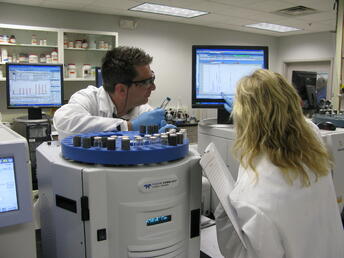 According to the American Chemistry Council, nearly 800,000 people in the United Sates are directly employed in the chemistry industry. In fact, chemical companies spent more than $56 billion in research and development in 2013, and 96 percent of all manufactured goods are directly touched by the chemical industry. In other words, a career in chemistry delivers a promising future.
According to the American Chemistry Council, nearly 800,000 people in the United Sates are directly employed in the chemistry industry. In fact, chemical companies spent more than $56 billion in research and development in 2013, and 96 percent of all manufactured goods are directly touched by the chemical industry. In other words, a career in chemistry delivers a promising future.
Teledyne’s alliance of technology-based companies serves customers in aviation, electronics, industrial and consumer markets. Our instruments are used in laboratories around the world to protect the environment, maintain the integrity of food and water supplies and to ensure the safety of manufacturing operations and the quality of consumer goods.
An application chemist focuses on the analysis of chemical compounds. Teledyne chemists are using our instruments to perform a variety of tests, such as determining pesticide residues in honey and polar pesticide residues in food of plant origins, and testing for fusel alcohol in alcoholic beverages and chemicals in wastewater. We not only manufacture our instruments, we also help our customers develop application-specific methods, as well as demonstrate the efficacy of our instruments for a wide range of commonly used sampling methods. As a result of these requirements, our application chemists are typically highly educated with many years of combined experience in their field, as well as, diverse education background.
Day in the Life
So what does a typical day look like for an application chemist?
It usually starts in the lab, checking on equipment and experiments that may have been left running over night. After checking on the experiments, additional samples are prepared to analyze, which could be anything from food extracts to pharmaceutical samples. Once the samples are prepared, the equipment is prepared to analyze the samples. Each solution needs to be prepared correctly so that the instrumentation can operate properly. Application notes, customer samples analyzed and customer demonstrations are also produced by chemists. (See the recent series on Headspace analysis on the importance of sample preparation)..
Because each instrumentation has its own software, the chemist is required to have the knowhow, to operate every piece of equipment in the laboratory. Application chemists also need to understand how each chemical behaves through the sample preparation and analysis procedures.
Once the tests are complete, the results need to be analyzed, which often requires a variety of calculations to determine the concentration of the compound.
These tests are important, helping pharmaceutical companies determine the purity of their drugs, government agencies to understand the level of pesticides in fruits, or law enforcement to determine the blood alcohol levels of accused drunk drivers. All of these challenges are resolved using Teledyne’s instruments and qualified chemists.
Our application chemists must have a love of science and problem solving, in addition to strong mathematical and literary skills. In many ways, the ability to clearly articulate the what, how and why of analytical results is just as important as the ability to generate quality data in an accurate and timely manner.
Think you have what it takes to work for Teledyne? Check out our current internship and job openings at www.teledynecareers.com.